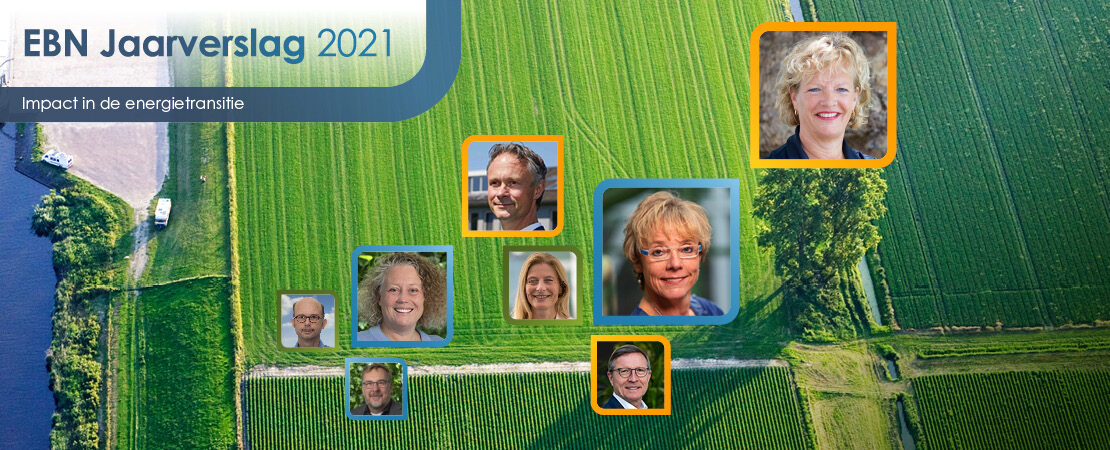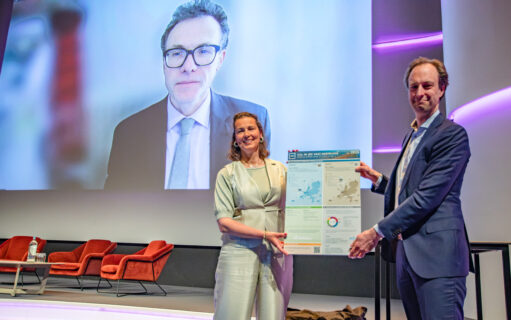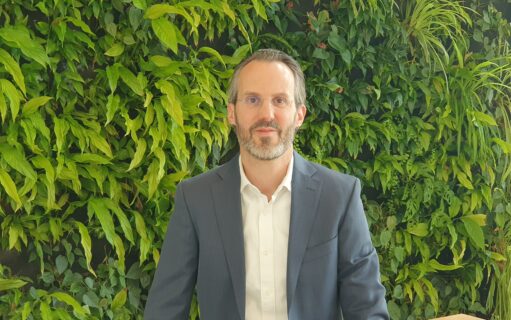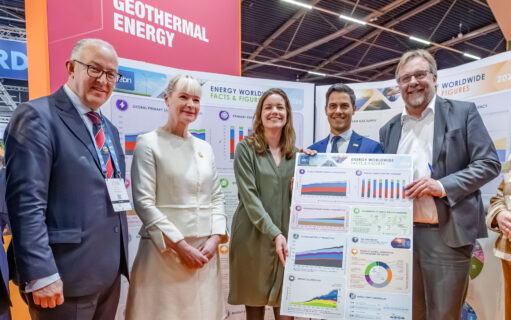Energie Beheer Nederland: progress and profit in 2021

2021 was a positive year for Energie Beheer Nederland (EBN) in two respects. It made further progress in boosting the sustainability of the gas value chain, thus making a substantial contribution to accelerating the energy transition, climate targets and the Coalition Agreement. Furthermore, the exceptionally high gas price resulted in a net profit of 656 million euros. However, all this is shadowed by the appalling war in Ukraine that has been raging since February.
Expansion of role
EBN operates from three strategic pillars: Our Dutch Gas, Return to Nature and New Energy. This strategy enables it to fulfil the ambitions of the Netherlands to build a sustainable energy system. This system includes new applications such as geothermal energy, hydrogen and green gas. There is also a role for CO2 capture and storage and (underground) energy storage. Jan Willem van Hoogstraten, CEO of EBN, explains “In 2021, concrete results were achieved in the various fields. Through the Porthos and Aramis projects, we are contributing to the development of CO2 storage. The first geothermal energy development project in the built environment came to fruition in Leeuwarden. And through the SCAN project, over the past two years we examined more than 1,500 kilometres of the Dutch subsurface for its suitability for geothermal energy. May of last year saw the publication of the letter to parliament concerning EBN’s role in the energy transition, in which there is a place for all the stated applications. This year, we expect to further define our specific role in all these areas.”
Dependence on, and importance of, the development of Dutch gas
It is clear that the proportion of renewable energy in the energy system is currently too small to cope without natural gas. EBN therefore advocates optimal and safe use of Dutch gas from the so-called small fields during the transition to a sustainable system. Domestic gas from the small fields is preferable to imports for a number of reasons: CO2 emissions are about 30% lower, it provides the Dutch society with gas revenues, creates employment opportunities and moreover, important knowledge of the subsurface can be preserved in this way.
The Netherlands has been a net importer of natural gas since 2018, and is therefore sensitive to international developments, says Jan Willem van Hoogstraten. “Scarcity in the international gas market caused high gas prices last year and a relatively low filling rate of the Dutch gas storage facilities (for high-calorific gas) at the beginning of winter. The concerns about affordability and security of supply as a result of this, and of the war in Ukraine, show how important it is that our energy system is and remains affordable and reliable.”
Financial developments
Last year was characterised by an exceptionally high gas price, which is reflected in EBN’s financial results. With a turnover of almost 3.0 billion euros, EBN achieved a positive result of 656 million euros. In 2020, turnover was still around 1.2 billion euros and a negative result of 364 million euros was achieved. In 2021, we increased our provisions for earthquake-related costs to almost 2.0 billion euros and provisions for the decommissioning of wells and facilities increased to 2.9 billion euros. Furthermore, our equity passed the 1.0 billion euro mark for the first time. The upshot of this is that EBN has taken an important step towards being more financially robust in the face of volatile market conditions and will be able to meet its future obligations.
Deploying infrastructure; Repurposing and decommissioning
EBN is working together with oil and gas companies through Nexstep to organise the decommissioning and repurposing of oil and gas infrastructure as safely, responsibly and efficiently as possible. Significant cost savings (EUR 2.0 billion) can be achieved over time by working together efficiently and effectively. The infrastructure can also be put to excellent use for the energy transition. A good example is CO2 storage in depleted offshore gas fields, whereby EBN has taken further steps in 2021 with the Porthos and Aramis projects, in cooperation with various partners. CO2 storage is an indispensable interim solution to achieving the 2030 climate targets. CO2 is expected to be stored for the first time in 2025, in an depleted gas field off the coast of Rotterdam.
Geothermal energy and the importance of developing the heat chain
With regard to making heat more sustainable, EBN is working closely with more and more parties in order to complete geothermal energy projects. Geothermal energy is an excellent and sustainable alternative to natural gas, particularly in the built environment and (greenhouse) horticulture. At the end of 2021, EBN was collaborating in some 30 projects. Meanwhile, in February 2022, EBN’s participation in geothermal energy projects will also be enshrined in the Mining Act, which means that more projects should come to fruition sooner. By 2030, we expect to be involved in some 200 geothermal energy wells in the Netherlands. Geothermal energy can only be developed successfully if heat networks are present, therefore it is not a stand-alone product but depends on the entire heat chain. The significance of this, as well as the right form of subsidy to facilitate such development, is an important consideration.
In order to map the subsurface, EBN continued with SCAN.. Areas of the Dutch subsurface that had not yet been explored were mapped out using seismic research in order gain insight in the potential of geothermal energy. The campaign has now been completed and 1571 kilometres of seismic research has been conducted. The next step is to use follow-up research to map out the potential presence of geothermal energy even better.
Informed dialogue: the importance of facts and figures in the energy transition
Due to its position in the various fields of the transition and its knowledge (subsurface, financial/economic and network), EBN is ideally positioned to support the right discussion and dialogue about the energy transition and its current status. It contributes to this with publications such as the digital Focus magazine and the EBN infographic “Energy in figures”. Furthermore, the Transition Talks series was launched in 2021, which discusses the progress of the energy transition interactively with parties that play a role in it. Also, EBN was the initiator of the publication “Zo werkt Energie in Nederland” (This is how energy works in the Netherlands); a publication compiled by 21 parties, which provides a complete overview of energy and the Dutch energy system. “North Sea Week” and “Geothermal Energy Week” were also held, during which numerous relevant topics were covered by various speakers. By providing platforms for the energy world to hold discussions, EBN will continue to facilitate the energy discussion in the Netherlands in the years to come.
Read our annual report ‘progress and profit in 2021’ here.







